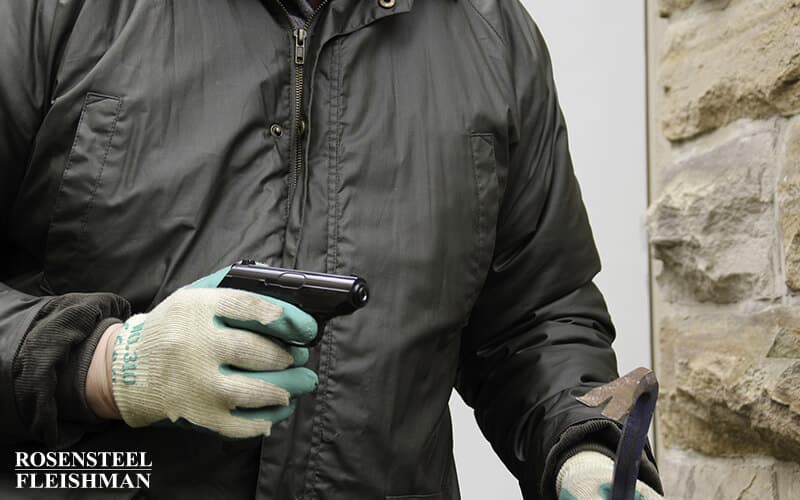Criminal Defense Lawyer for Deadly Weapon Assault Charges

An assault involving the use of a deadly weapon significantly elevates the severity of the charge and its potential consequences. If you have been charged with assault with a deadly weapon, it’s important to contact an attorney at Rosensteel Fleishman Car Accident & Injury Lawyers. Our team is prepared to build a strong defense tailored to the specifics of your case.
Assault with a Deadly Weapon Definition
If you commit an assault and inflict serious injury or use a deadly weapon, you are guilty of a Class A1 misdemeanor. (A simple assault is a Class 2 misdemeanor.) This crime is found in G.S. 14-33(c)(1) which states that:
Unless the conduct is covered under some other provision of law providing greater punishment, any person who commits any assault, assault and battery, or affray is guilty of a Class A1 misdemeanor if, in the course of the assault, assault and battery, or affray, he or she… [i]nflicts serious injury upon another person or uses a deadly weapon.
However, if you commit an assault with a deadly weapon and inflict serious injury or have intent to kill, you are guilty of a felony under G.S. 14-32 which states that
- Any person who assaults another person with a deadly weapon with intent to kill and inflicts serious injury shall be punished as a Class C felon.
- Any person who assaults another person with a deadly weapon and inflicts serious injury shall be punished as a Class E felon.
- Any person who assaults another person with a deadly weapon with intent to kill shall be punished as a Class E felon.
Deadly Weapon:
North Carolina courts have defined a deadly weapon as “one which, under the circumstances of its use, is likely to cause death or great bodily harm.” Furthermore. “[t]he deadly character of the weapon depends sometimes more upon the manner of its use and the condition of the person assaulted than upon the intrinsic character of the weapon itself.
Some weapons are so inherently dangerous that they are considered per se deadly weapons. Some examples of a per se deadly weapon are a rifle or a pistol. If a per se deadly weapon is used in an assault, then the assault is automatically an assault with a deadly weapon. However, if the weapon used is not a per se deadly weapon, then the prosecutors must prove that the weapon used is a deadly weapon.
Many other items can be found to be deadly weapons based upon the manner in which they are used. Sometimes a court will find a weapon deadly as a matter of law based on the manner of use. Examples of these types of weapons are a car driven at a high speed directly at a person, a pickaxe, certain kinds of knives and a very large rock thrown deliberately at a car approaching a speed of 55-60 mph. If a weapon is found deadly as a matter of law, this issue is determined by the judge and not submitted to the jury.
Other weapons are submitted to the jury to determine their deadliness. Examples of weapons that might be found to be deadly but are not per se deadly weapons are a 2×4 board, a person’s body, a dulled pocketknife, a car, and a chair. When a jury determines whether a weapon is deadly, it should consider the nature of the weapon, the manner in which it is used, and the size and strength of the defendant compared to that of the victim.
Serious Injury
North Carolina courts have deliberately chosen not to define what a serious injury is specifically, but a serious injury generally means a physical or bodily injury resulting from an assault. The courts have set out factors that are relevant in determining whether an injury is serious: “(1) pain and suffering; (2) loss of blood; (3) hospitalization; and (4) time lost from work.” Courts have cautioned, however, that hospitalization is not required for an injury to qualify as serious.
Intent to Kill
The intent to kill is an element that must be reasonably inferred from the proven facts. Courts have stated that “[t]his inference may be made from the nature of the assault, the manner in which the assault was made, the conduct of the parties, or from any other relevant circumstance.” In addition, “[t]he requisite intent may be inferred from the deadly character of the weapon used and the viciousness of the assault."
Self-Defense
As with other assault charges, a person charged with assault with a deadly weapon may raise the affirmative defense of self-defense. However, deadly force is not always justified for self-defense. North Carolina courts have made clear that “the only justification for the use of deadly force is a reasonable belief that one is in danger of death or great bodily harm.” Therefore, “where the assault being made upon defendant is insufficient to give rise to a reasonable apprehension of death or great bodily harm, then the use of deadly force by defendant to protect himself from bodily injury or offensive physical contact is excessive force as a matter of law.”
Typically, “the law does not justify or excuse the use of a deadly weapon to repel a simple assault.” However, “[t]his principle does not apply… where from the testimony it may be inferred that the use of such weapon was or appeared to be reasonably necessary to save the person assaulted from great bodily harm[.]”
Punishment
If you commit an assault with a deadly weapon and cause serious injury or have intent to kill, you are guilty of a Class E felony. A person with no prior convictions who is found guilty of a Class E felony receives a sentence between 15 and 31 months of imprisonment. However, prior convictions can increase the sentence to up to 63 months.
If you commit an assault with a deadly weapon and cause serious injury and have intent to kill, you are guilty of a Class C felony. A person with no prior convictions who is found guilty of a Class C felony receives a sentence between 44 and 92 months of imprisonment. Prior convictions can increase the sentence to up to 182 months.
Speak to a Charlotte, NC Criminal Defense Lawyer Today
Being charged with assault with a deadly weapon is a serious matter and can lead to severe consequences if convicted. It is crucial to have an experienced criminal defense lawyer on your side who can guide you through the legal process and work to build a strong, effective defense tailored to your situation.
At Rosensteel Fleishman Car Accident & Injury Lawyers, our criminal defense lawyers have the experience and knowledge to handle even the most complex cases. We understand the stakes are high and are dedicated to fighting for your rights and protecting your future.
Don't wait, call (704) 714-1450 today to schedule a consultation and discuss your options with a Charlotte criminal defense attorney. Our team is available to assist you and provide the legal guidance you need to face these charges head on.

